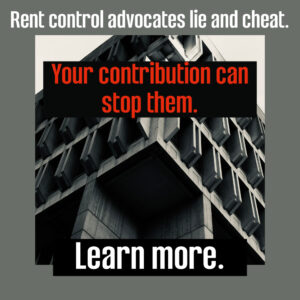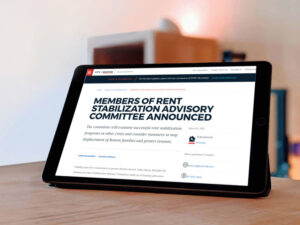193 H3744 An Act for a special law authorizing the city of Boston to implement rent stabilization and tenant eviction protections
Summary
Boston's proposal would allow it to create a rent control board and detailed ordinances. The proposed scope is to restrict:
- renovations,
- condo conversions,
- evictions and
- rent prices.
This form of rent control would have little to no predictability for owners. It uses the "fair return standards" used in the 1970s and 1980s. This requires owner to provide a statement of income before the rent board authorizes a rent increase.
There is a lot of advocacy around a distraction price, which is that allegedly rents can always increase by inflation plus six percent. That is purposely misleading.
First, there is a cap such even in high inflation years, landlords will be held below market. There is no recognition whatsoever that landlords need to keep pace with real estate taxes, insurance, repairs and more each year. Second, the rent boards will decide how much of a return on investment is fair. Rent increases at or below inflation may be denied if the owner is perceived as making too much money.
Landlords would be forbidden from terminating a tenancy in order to renovate. Landlords would also be forbidden from relocating a renter temporarily, renovating, and putting them back at a higher rent. This guarantees our properties will fall behind on capital improvements.
Developers, who represented half of the bill drafters, stand to gain enormously. When rent-controlled properties are undercapitalized and allowed to rot, landlords eventually sell out at distressed prices.
This proposal has very little to do with helping low-income renters. It has a lot to do with beating down old owners and their buildings so that developers can redevelop the lots. And it has a lot to do with Boston not wanting to pay for the needed rental assistance.
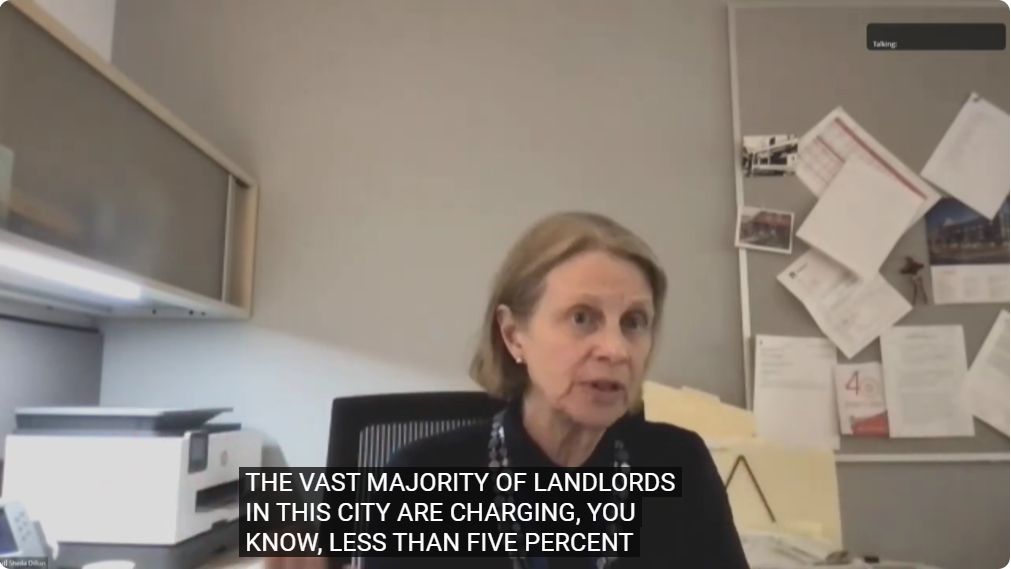
Sheila Dillion, Chief, Office of Housing Stability, addressing Boston City Council Feb 22, 2023 about how the vast majority of landlords are not raising the rent too fast. So why do we need this policy?
How to submit testimony to the Joint Committee on Housing
For the hearing November 14, adapt the text below and email it to Luke O'Roark at luke.oroark@mahouse.gov and Christianna Golden at christianna.golden@masenate.gov. Official hearing page. here.
From: You
To: <Luke O'Roark> luke.oroark@mahouse.gov, <Christianna Golden> christianna.golden@masenate.gov
Subject: Testimony opposed to H.3744 Boston rent control
Body:
Hi Senator and Team,
I'm a responsible owner and I'm asking you to vote against H.3744 Boston's rent control. I understand the need to help renters afford an apartment. This is why (give an example of what you do to help). This is also why MassLandlords has taken a lead in litigating against the Department of Housing and Livable Communities to ensure rental assistance works for everyone.
But I should have the right to renovate my property. I shouldn't have to ask permission from a rent control board. This is going to make it very hard to me to maintain my property.
I agree with MassLandlords that it looks like developers had an outsized influence on this. If I can't terminate a tenancy to make big repairs, then I have no future. Only developers have a future in that kind of city. I urge you to vote against this bill as "ought not pass."
Sincerely,
(list your name and address, if not in their district, and where your own property in your district.)
Custom testimony is always better. If you want to read our notes here and comment on anything that particularly concerns you, please edit the note above.
Full Text Explained
The text below is what was filed and before the Joint Committee on Housing as of November 12, 2023. We have broken up the section to show where certain parts came from, what they mean and how they would play out. Note that sometimes what is most important is what is invisible. There is no input from landlords at all. And that is the point! Developers wrote this bill to beat us down and buy our property at distressed asset prices.

Tim Davis addresses the Boston City Council February 22, 2023 to explain why the bill was so developer-friendly. "It was intended to be consistent with what developers were looking at... that was another way of addressing all the psychology about developers."
Feb 22 Zoom at 0:40: "Working with our partners at the BPDA and the BHA as well as our nonprofit and for-profit development partners, the city has employed many strategies to solve Boston's housing issues." Sheila Dillon excludes landlords.
Feb 22 Zoom at 1:15: "We crafted this so that we would continue to see development happen in every neighborhood. We really want to see development happen." Sheila Dillon
Feb 22 Zoom at 1:24 "What developers are looking for in their timeline is 10 to 15 years." Tim Davis
Feb 22 Zoom at 1:43 "Tight control of the market ... may lead to a lack of development." Tim Davis
|
ORDERED: That a petition to the General Court, accompanied by a bill for a special law relating to the City of Boston to be filed with an attested copy of this order be, and hereby is, approved under Clause 1 of Section 8 of Article II, as amended, of the Articles of Amendment to the Constitution of the Commonwealth of Massachusetts, provided that the Legislature may reasonably vary the form and substance of the requested legislation within the scope of the general public objectives of this petition. |
Boston cannot pass rent control because Massachusetts General Law Chapter 40P already defines what kind of rent control a city can have. Landlords wrote Chapter 40P in the early 1990s. We still support this form of rent control. Chapter 40P allows the city to set whatever rents it wants. The major caveat is that the city must reimburse owners the difference between market rents and controlled rents. This would be very expensive for Boston. So, Boston has copy-pasted a rent control from the 1970s and 1980s, and applied heavy smears of fresh paint where the walls of that system had structural failings. Boston asks the legislature to go back in time to before landlords had a form of rent control we could live with. |
|
PETITION FOR A SPECIAL LAW AUTHORIZING THE CITY OF BOSTON TO IMPLEMENT RENT STABILIZATION AND TENANT EVICTION PROTECTIONS SECTION 1. Findings and purpose. The general court finds and declares that a serious state of emergency exists in the City of Boston (“the City”) with respect to housing, whereby there is an inadequate supply of low cost rental housing; |
Yes. Over half of Boston is zoned single-family. See the Metropolitan Area Planning Council Zoning Atlas. |
|
that, further action to protect residents from exorbitant rent increases and evictions is necessary to address serious threats to the public health, safety and general welfare, including housing insecurity, rent burden, homelessness, and displacement, and further finds that a rent stabilization ordinance will address the most egregious rent increases. |
It’s tempting to claim that rent control will help everyone do everything. Rent control will help only people who have an apartment the day the law is passed. On homelessness in particular, note that in 2009 the American Institute for Economic Research did a survey of all economic research on rent control and found it affected many things, but homelessness was the one area for which there was no signal at all. This is hardly surprising, as homelessness has many causes. None of the folks at Mass and Cass, for instance, could be described as camped there primarily for lack of rent control. Substance abuse and mental health are serious challenges and have separate solutions. |
|
SECTION 2. Power for local rent regulation. The City of Boston may, by ordinance, regulate the rent in multi-family housing and provide for reasonable exemptions from such regulation. (a) This section shall not apply to the following types of residential properties or residential circumstances: |
|
|
(i) Properties with six or fewer dwelling units in which one of the dwelling units is the owner’s principal residence. |
Owner-occupied properties of six units and less are exempt. This is a political divide-and-conquer, not intended to help small owners. Think about the senior landlord in assisted living who depends on her family three-decker for income. She is subject to rent control. |
|
(ii) Units in hotels, motels, or other facilities occupied by transient guests. |
|
|
(iii) Housing accommodations in a nonprofit hospital, religious facility, extended care facility, or licensed residential care facility for the elderly. |
|
|
(iv) Dormitories owned and operated by an institution of higher education. |
Boston University is exempted under this bill. Megan Sandel, Associate Professor of Pediatric Medicine at Boston University, was one of the 25 Rent Stabilization Advisory Committee (RSAC) members who drafted this bill. Per the Office of Campaign and Political Finance, she personally had donated $1,500 to Boston political races before she was appointed. BU was a major OCPF heavyweight, having collectively donated $597,780.57 prior to appointment. |
|
(v) Dwelling units in which the tenant shares bathroom or kitchen facilities with the owner who maintains their principal residence at the residential real property. |
|
|
(vi) Dwelling units for which the permanent certificate of occupancy is less than 15 years old and were created as a result of 1) Ground up new construction, 2) a physical addition to an existing residential building, or 3) conversion from another use to residential. |
Developers are exempted. Twelve of the 25 RSAC appointees are developers (Massachusetts has both for-profit and non-profit developers). As we will show later, developers have a particular interest not just in exempting themselves, but also in creating a particularly brutal regime for landlords. Landlords being forced to sell distressed assets at bargain basement prices will create more opportunity for developers. The developers who participated in the RSAC are:
Not one landlord organization was on the RSAC. |
|
(vii) Dwelling units where the tenant pays a set percentage of their income to rent, either because they hold a voucher, the unit is public housing, the unit has a project based voucher, or where applicable federal or state law or administrative regulations specifically exempt them from rent stabilization regulations. |
Section 8, for example, guarantees that a renter will pay no more than one-third of their income to rent. (MassLandlords Staff Note A) |
|
(b) The City, on an annual basis, may set an annual maximum percentage rent increase for rental units covered by this section, based on the change in the consumer price index, plus six percent, or a maximum percentage increase of ten percent, whichever is lower. |
This is politically clever distraction pricing. Further on, we see the Rent Control Board can and will override this objective-sounding formula. |
|
“Consumer price index” refers to the annual 12-month average change in the Consumer Price Index for All Urban Consumers, Boston-Cambridge-Newton (All Items), as published by the Bureau of Labor Statistics of the United States Department of Labor in September of the prior calendar year. |
|
|
(c) For rental dwelling units covered by this section, an owner shall not, over the course of any 12-month period, increase the gross rental rate for a more than the percentage allowed in part (b) above, times the lowest gross rental rate charged for that tenant at any time during the 12 months prior to the effective date of the increase. |
Rent can be increased only once per year. Landlords under rent control historically have increased rents as fast as possible each year. Whereas landlords without rent regulation often give inflation-based or no rent increases to good tenants, sometimes with disastrous effect. Many senior landlords have found themselves a decade behind on rent increases and suddenly unable to make repairs or pay rising insurance and taxes. It's really a myth that all landlords raise rents as fast as possible. But once rent control enters the equation, we do. |
|
(d) For a new tenancy in which no tenant from the prior tenancy remains in lawful possession of the dwelling unit, the owner may establish the initial rental rate not subject to this section. |
This is sometimes called “vacancy decontrol.” |
|
This section is only applicable to subsequent increases after that initial rental rate has been established. |
|
|
(e) The City may provide for fair return standards for the regulation of rent, which may include but are not limited to, changes to permissible rental rates based upon certain maintenance and capital costs and rapid increases in property taxes. |
This is the section that invalidates the objective inflation-based formula. “Fair return standards” require owners to produce a detailed statement of net income (for a for-profit owner, sometimes called a “profit and loss statement”). Rent increases will be denied for many landlords. 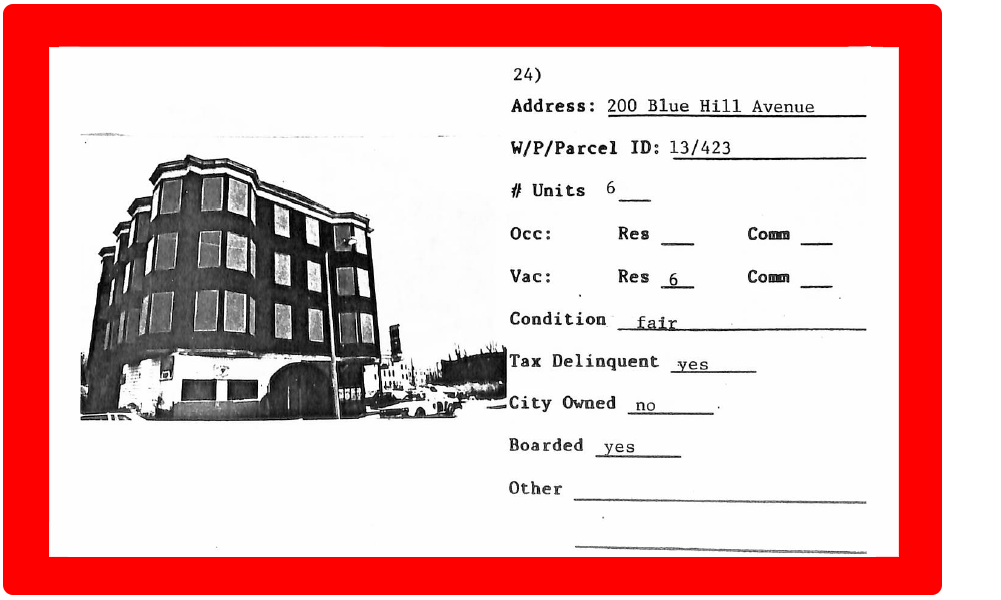 |
|
(f) The City may set tenant notification and rental registration requirements as necessary to effectuate this section. |
The City fails to the tell the Legislature that it already has a rental registry. Last we checked, the Boston rental registry was not working, and was unfairly and unevenly enforced, with many bad operators still unregistered. |
|
(g) The City may establish or designate an administrator or board, to promulgate regulations pursuant to this section and govern local rent regulation. |
The rent control board is further evidence the City intends for the inflation math to be distraction pricing. The primary purpose of the board is to evaluate fair net operating income and hold rent increases down. |
|
SECTION 3. Just cause eviction protection. The provisions of this section shall be applicable to all housing accommodations in the City of Boston; provided however, that the City may provide for exemptions from the provisions of this section and any such exemption shall be included in an ordinance adopted by the City. |
Eviction restrictions are necessary to enforce this older, second-generation form of rent control. Whereas rent control had many exemptions for divide-and-conquer reasons, just-cause eviction is itself a concern for only landlords. So there are no exemptions for dorms, hotels, developers, etc., because none of them must use eviction in the first place. They have alternate procedures to recover their premises from bad actors. Developers condemn their buildings, after which the Board of Health removes the renters. Dorms and hotels are allowed to grant licenses, not tenancies, and license breakers can be removed by police force. Landlords cannot legally grant licenses due to a long history of housing court case law interpreting this as a work-around to tenant protections. Dorms, hotels and developers continue to enjoy the work-around. |
|
The City may, by ordinance, provide that a owner shall not recover possession of a leased unit within residential dwelling unit unless the Housing Court finds that: |
This creates a convoluted double-eviction process. A landlord must go to housing court first. Then if they win, they must go before the Rent Control Board. This would essentially invalidate court jurisdiction in the city of Boston. |
|
(a) the tenant has failed to pay the rent to which the owner is entitled; |
|
|
(b) the tenant has violated an obligation or covenant of his or her tenancy not inconsistent with Massachusetts General Law chapter 93A, or this section, or the regulations issued pursuant thereto, other than the obligation to surrender possession upon proper notice; |
Chapter 93A declares that any unfair or deceptive practice in the conduct of a trade or business is unlawful. |
|
and the tenant has failed to cure such violation after having received written notice thereof from the owner; |
How long does a renter have to cure? The Rent Control Board will decide. Because the Rent Control Board’s purpose has historically been to beat landlords down into submission, the standards are likely to be case-by-case, meaning as long as they want. It will depend on whether the landlord before the Board is politically connected, perceived to be smart and like the others, or not. Landlords who have lower educational attainment or speak English as a second language are particularly likely to experience discrimination under arbitrary procedures, as is seen commonly at Zoning Boards of Appeal hearings for special permits. |
|
(c) the tenant is committing or permitting to exist a nuisance in or is causing substantial damage to the leased unit, or is creating a substantial interference with the comfort, safety or enjoyment of the owner or other occupants of the same or any adjacent accommodations; |
Note that if a renter is causing a problem with neighboring businesses (e.g., a Mass and Cass type scenario), the landlord will have no power to evict. It’s not clear even that a landlord could evict for trouble with occupants in another building. As presently used in the Airbnb ban in Boston, “adjacent” means “contained in the same building.” |
|
(d) the tenant has used or permitted a leased unit to be used for any illegal purposes; |
|
|
(e) the tenant, who had a written lease agreement which terminated or is a tenant at will, has refused, after written request or demand by the owner, to execute a written extension or renewal thereof or lease for a further term of like duration, at a rental rate that does not exceed the percentage set by the City of Boston, in accordance with this legislation and the ordinance enacted as a result of this legislation; |
This could be reworded, “(e) the tenant’s rental agreement lapsed, but they refuse to sign a new rental agreement, provided the new agreement doesn’t raise the rent more than the Rent Control Board permits.” |
|
(f) the tenant has refused the owner reasonable access to the unit for the purpose of making necessary repairs or improvements required by the laws of the commonwealth or the City of Boston, or for the purpose of inspection as permitted or required by such tenant's lease agreement or by law, or for the purpose of showing the leased unit to any prospective purchaser or mortgagee; |
This section echoes General Law Chapter 186 Section 15B (1), which says a lessor may enter:
Note that this ordinance removes the landlord’s power to show the apartment to a new renter. It also leaves open for argument at the Rent Control Board whether the landlord has the right to check for abandonment or security deposit damage. |
|
(g) the person holding at the end of a lease term is a subtenant not approved by the owner; |
This could be reworded, “(g) the tenant you knew left and you’ve got an unauthorized occupant left in their place.” |
|
(h) the owner seeks in good faith to recover possession of a leased unit for his or her own use and occupancy or for the use and occupancy by his or her spouse, children, grandchildren, great grandchildren, parents, grandparents, brother, sister, father-in-law, mother-in-law, son-in-law, or daughter-in-law, and has provided the tenant with notice and a relocation payment as established by the City by ordinance; |
The Rent Control Board could set the relocation payment to be astronomically high such that landlords could never recover possession for their own use. This also puts the state in the business of endorsing Boston’s particular family and interpersonal values. What if an aunt wants the apartment for her niece? In Boston, the aunt-niece relationship is not important enough, she cannot recover her property for this purpose. What about a soul mate who has shared their life with another since high school but with whom they neither cohabit nor plan to marry? This is equally unvalued. And because there are no exemptions for owners of any size, this arbitrary cruelty would apply to the aunt or soulmate who owns no other real estate but the one rental unit. This clause holds up particularly poorly in view of Ferreira v. Charland 2023, an example of a one-unit owner made homeless by being barred from possession of their only real estate. A single-family owner left her home to cohabit with another. She rented the home but made a good faith error in water billing. The cohabiting relationship failed, but the water billing error prevented her accessing her home for three years, despite the error having been made in good faith. Last we heard in October 2023, she was still homeless. |

Davis speaking at the Feb 22 zoom described the worst-case relocation assistance payment and their intent to expand it. "Five year notice, $15,000 relocation fee... We'll be able to expand that to all property types."
|
or (i) the owner seeks to recover possession for any other just cause, provided that his or her purpose is not in conflict with the provisions and purposes of said chapter 93A or this section. |
History shows the Rent Board alone would be empowered to define additional just causes. An owner would never be allowed to argue their own. |
|
SECTION 4. Condominium and cooperative conversions. |
Real estate investors who did not wish to participate in rent control historically converted their buildings into condos and sold them off piecemeal. In an effort to Band-Aid this critical flaw of rent control, Boston must ask for additional condo restrictions. Note that condo conversion is already regulated in all 4+ unit buildings and has been since 1983. |
|
The City of Boston may, by ordinance, regulate the conversion of residential dwellings to condominiums or cooperatives. |
|
|
Such ordinance may include tenant notification requirements, relocation plans, tenant relocation payments, permits, permit fees, and exemptions. |
Here again we see the likely extortionate “tenant relocation payment” set by the Rent Control Board. |
|
Notification requirements and relocation payments may vary based on income, age, and disability. |
This ought to raise a question as to how income, age and disability will be verified. During rent control in Boston and Cambridge, a very simple sounding policy framework resulted in hundreds of pages of regulation. This complexity already exists in other places, for instance, RAFT applications and reasonable accommodations, and should be expected to require substantial municipal budget. |
|
SECTION 5. Demolitions and substantial renovations. |
Here the heavy developer influence becomes apparent. Developers in today’s market can only make money on a property if they can purchase the land at a distressed price. The Rent Control Board will then stop private landlord ability to renovate until the building becomes unstable and must be sold. This is exactly what happened in Boston in the 1980s, resulting in Mayor Flynn calling for the survey of boarded up properties. |
|
The City of Boston may, by ordinance, create requirements for tenant notification requirements, relocation plans, and tenant relocation payments where an owner is seeking to demolish or substantially renovate a property that requires a tenant to move. |
Note that “demolish” is a legal term that includes removal of any wall, e.g., to conduct a basic plumbing repair. If the wall contains a substrate layer of lead paint (common), the tenant must be relocated. Does that count as requiring a tenant to move? The Rent Control Board will decide. |
|
Notification requirements and relocation payments may vary based on income, age, and disability. |
|
|
SECTION 6. Severance Clause. |
The City know this ordinance is hated by housing operators and will be mercilessly litigated against. Anticipating decades of public money spent defending against this, they have made it clear that when one piece eventually succumbs to justice, the rest may yet stand until the next court decision. |
|
The determination or declaration that any provision of this act is beyond the authority of the general court or is preempted by law or regulation shall not affect the validity or enforceability of any other provisions. |
|
|
SECTION 7. Effective Date. |
|
|
This act shall take effect immediately upon signing by the Governor. |
Housing operators in Boston have told MassLandlords they have raised rents quickly in anticipation, especially where rents had previously remained low. That is not what anyone wanted or planned to do and shows how seriously misguided and punitive this proposal looks to housing operators. The City would have known all this if they had invited us to participate at the outset. They did not. They refuse to disclose the reasons for the appointment of the RSAC members above. This remains in litigation, MassLandlords vs. City of Boston docket number 2384cv00483. |
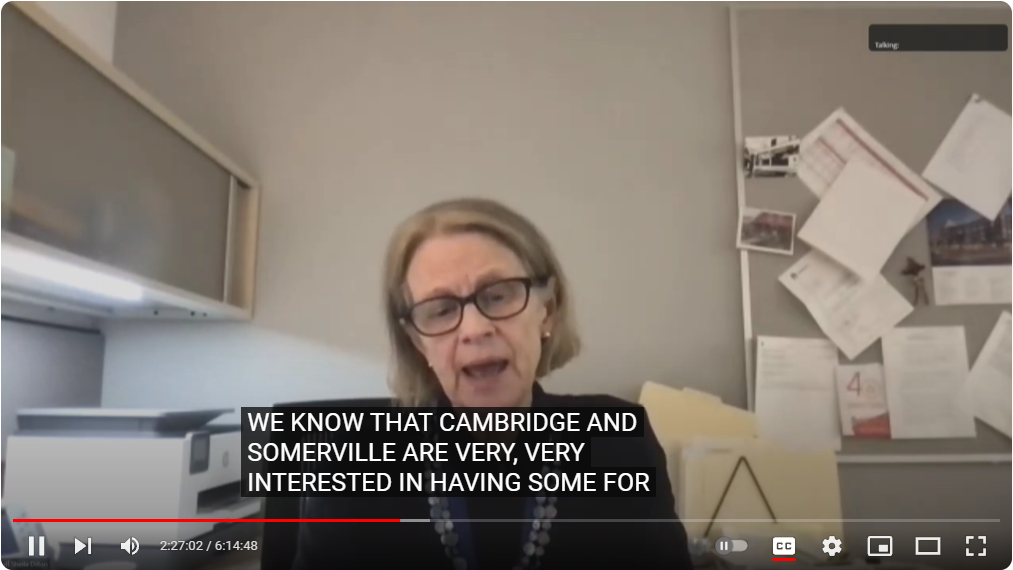
This is a bill with possible statewide disastrous impact. On Feb 22, Dillon said, ""We know that Cambridge and Somerville are very very intrested in having some form of rent stabilization. I think -- I know they are watching what happens here very closely. If the legislature approve this, I would betcha that they would file something very very quickly."
What's the alternative?
Rental assistance. Rental assistance can effectively freeze rents at a zero percent annual increase forever, if we want! And by paying the difference between what a renter can afford and what the market requires, we can ensure housing providers still have the funding to operate.
Write a custom note about how you want to make repairs and charge fair rent without a rent board telling you no. No repairs, no tenancy terminations, no rent increases means no rental housing.

